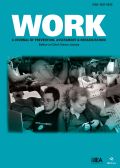Authors: Poole, Janet L. | Anwar, Sahar | Mendelson, Cindy | Allaire, Saralynn
Article Type:
Research Article
Abstract:
BACKGROUND: Systemic sclerosis (SSc) is an auto-immune connective tissue disease characterized by fibrosis of skin, blood vessels, and internal organs that results in significant disability. OBJECTIVE: To identify the work barriers faced by people with systemic sclerosis (SSc) in maintaining employment. METHODS: Thirty-six people with SSc who were working more than 8 hours per week completed the Work Experience Survey, which contains lists of potential work barriers, including the ability to travel to and from work; get around at work; perform essential job functions, including physical, cognitive, and task-related activities; work with others; and manage
…work conditions. RESULTS: Thirty-three participants completed and returned the questionnaires, most of whom were female, and working full time and in professional careers. Principal disease symptoms included fatigue, Raynaud’s phenomenon, esophageal involvement, and leg or hand/wrist pain. All participants reported some barriers with a mean of 18 barriers per participant. At least three quarters of participants cited outside temperature (82%), cold temperatures inside the workplace (76%), and household work (76%), as barriers. The next most common barriers were using both hands (64%), arranging and taking part in social activities (64%), being able to provide self-care (61%) and working 8 hours (58%). CONCLUSION: Participants reported a wide range of barriers, from cold temperatures, to physical job, fatigue related, and non-workplace demands, in maintaining the worker role. The barriers reflect the disease symptoms they reported. Identifying workplace barriers facilitates the creation of job accommodations or adaptations that will allow people with SSc to continue working.
Show more
Keywords: Employment, disability, rheumatic disease
DOI: 10.3233/WOR-162448
Citation: Work,
vol. 55, no. 4, pp. 923-929, 2016
Price: EUR 27.50






